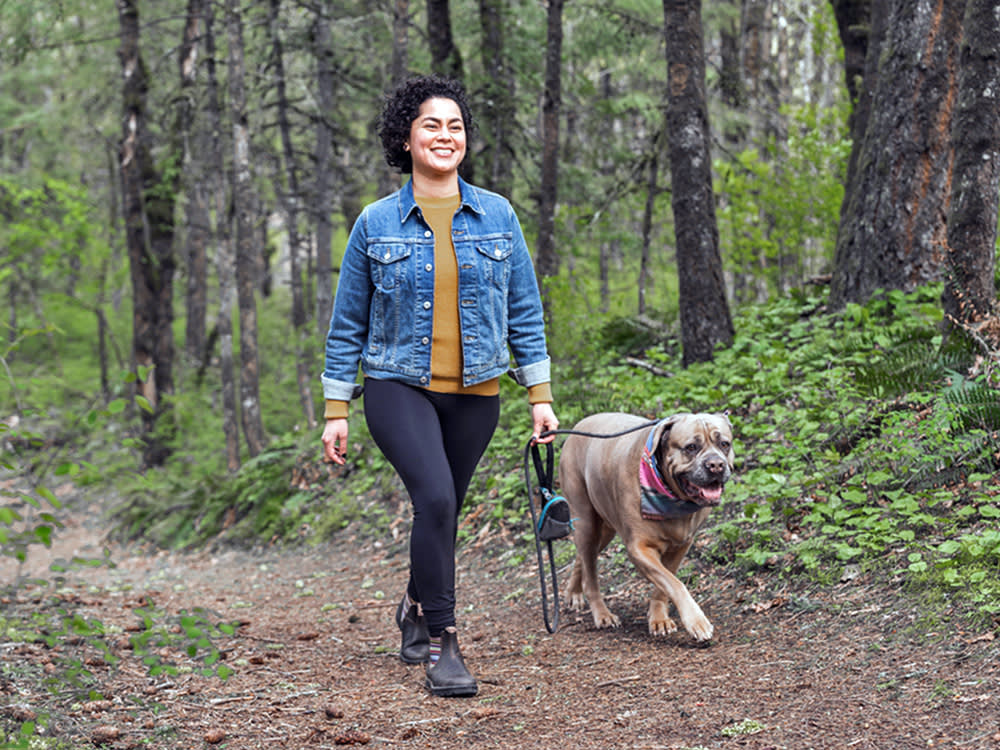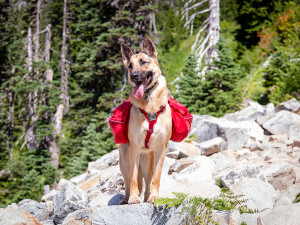What to Do If Your Dog Gets Bit By a Rattlesnake
And if the worst happens, never try to suck out the venom yourself.

Share Article
In This Article:
Signs of Rattlesnake Bites in Dogs What Should I Do If My Dog Was Bitten By a Rattlesnake? Is There A Rattlesnake Bite Vaccine for Dogs? What Is Rattlesnake Antivenom? Tips for Preventing Rattlesnake Bites in Dogs Frequently Asked Questions
While rattlesnakes are generally associated with deserts, it’s possible to encounter them in other environments. And with the summer months upon us, they are out and more active than ever. If you enjoy exploring the outdoors with your dog, it’s vital to know what to do should your dog end up on the wrong side of one of these rattling reptiles.
Signs of rattlesnake bites in dogs
The symptoms of a rattlesnake bite may vary depending on where you live. Veterinarian Dr. David Israel, medical director for Veterinary Emergency Group in Denver tells us “different types of snakes can have different effects on dogs.”
In some cases, you may hear your dog yelp if you’re around when the bite happens. But, that’s not always the case, and snake bites can be tricky to determine if you didn’t witness it.

The main sign is swelling around a bite area — you’ll see two specific marks from the fangs. The most common areas of snake bites for dogs are on their face or on the feet/legs. “Within a short period, swelling is noted at the region of the bite. This swelling can rapidly progress from mild to severe within the first few hours and usually worsens in the first 48 hours after the bite,” Dr. Israel says.
If not treated quickly, symptoms can progress to more systematic problems:
Excessive bleeding from the wound
Vomiting
Bloody diarrhea
Sudden collapse
Neurologic signs (seizures, stumbling, disorientation, etc.)
Difficulty breathing
Shock and possible death
Dr. Israel also mentions that “dry bites” are possible, meaning no venom is injected during the bite. Even if this may be the case, it’s always essential to have your dog seen by a vet right away.
What should I do if my dog was bitten by a rattlesnake?
If a rattlesnake bites your dog, keep them as calm and still as possible, and seek immediate veterinary care. Avoid trying home remedies or using a tourniquet; these can worsen the situation.
1. Move your pup away.
If you see the bite in action, move your pup away from the rattlesnake immediately. Don’t try to take pictures of it or try to relocate it for risk of you or your dog getting bitten again.
2. Keep your dog still.
Staying still and calm will help slow the spread of the venom in your dog. Be mindful, though, that your pup will likely be in pain and stressed, which can potentially lead to them lashing out. If the rattlesnake bite isn’t on their head or face, you may consider putting a muzzle on them for handling to prevent further injuries.
3. Seek veterinary care.
Dr. Israel says pet owners “should bring their dog to the nearest veterinarian as soon as possible. Ideally to an emergency vet, as most emergency vet hospitals will carry antivenin.”
4. Bring help if possible.
Having an extra set of hands while driving to the vet can be extremely beneficial to getting your dog in the car and keeping them still while on the way.
Is there a rattlesnake-bite vaccine?
There is a rattlesnake-bite vaccine for dogs, but it’s not all it’s cracked up to be. In theory, the vaccine is meant to build up your dog’s immunity to snake venom.
However, it’s generally not recommended by many vets as it has questionable efficacy and can actually lead to stronger reactions. And according to Dr. Israel: “Dogs who are vaccinated for rattlesnake bites still need the same treatment as those who have not received the vaccine.”
What is rattlesnake antivenom?
Antivenin, also called antivenom, is the most important clinical treatment for rattlesnake bites (and other pit vipers). It works to neutralize the venom and reduce your dog’s pain. The downside? It can be extremely expensive. One vial alone can range from $600 to $1,000 and your pup will likely need multiple depending on their size.
The sooner your dog can be injected with antivenom — preferably within 4 hours of the bite—the better their odds at a full recovery.
Tips for preventing rattlesnake bites in dogs
1. Keep your dog on a leash.
Always have your dog on the leash when out walking to avoid them from wandering into snake territory. This is especially true during the warm months when rattlers are most active.
2. Avoid free-roaming in snake-prone areas.
If you do let your pup off the leash, make sure it’s away from areas that are known hotspots for snakes. You should steer clear of tall brush, large boulders, and visible holes in the ground.
3. Always watch your dog while outside.
Keep an eye on your dog when they’re outside. Call them away from any areas that may be suspect or are out of sight. If they do happen upon a snake and get bitten, you’ll at least be able to quickly jump into action and get them the treatment they need.
4. Enroll in snake training.
Have your dog enrolled in snake aversion training classes. Many dogs hear the rattle of a snake and think it’s a toy. These training classes use conditioning techniques to teach your dog to avoid the rattling instead.
Are there at-home remedies for rattlesnake bites?
Unfortunately, no. Dr. Israel explains, “There are no safe at-home remedies for rattlesnake bites. It is crucial for dogs bitten by rattlesnakes to be seen by a veterinarian as soon as possible.”
Don’t mess with the bite site, don’t try to suck the venom out, don’t apply a tourniquet —these can all cause further delay and lead to more problems for your dog.
FAQs (People also ask):
What is the survival rate in dogs that have been bit by a rattlesnake?
This can vary based on the dog’s size and overall health, the amount of venom injected by the snake, and how fast your pup gets care. In general, most dogs treated before more serious symptoms show will survive. As more issues arise, the lower the chances of the dog surviving.
Should my dog get the rattlesnake vaccine?
If your dog lives in an area with a high likelihood to encounter rattlesnakes, your vet may recommend the vaccine. However, many vets don’t suggest giving your dog the rattlesnake vaccine as there are no scientific studies or data to ensure its efficacy.
Can a rattlesnake kill a dog?
Unfortunately, yes. If your dog doesn’t receive medical care quickly, it’s possible for the symptoms of a rattlesnake bite to progress, including sudden death. Dogs who are seen by a veterinarian promptly have a much higher chance at survival.

Emily Johnson
Emily Johnson is a long-time pet writer and animal lover, working with brands like PetMD, Chewy, Whisker, Great Pet Care, Rover, GoodRX, and more on topics including pet health, training, overall ownership tips, and pet insurance. You can typically find Emily with a cat in her lap and a Diet Coke in hand, exploring the outdoors with her pup, or tending to her jungle of indoor plants. At home, she has a dog (Goose), two cats (Zoey and Nugget), and a horse (Dewey).
Related articles
![A woman walking with her dog in a garden.]()
How to Take Your Dog On a Mindful Nature Walk
Wellness experts and animal trainers agree: A tuned-in outdoor outing can be restorative for both people and pets.
![A German Shepherd dog wearing a red hiking backpack on a rocky trail.]()
11 Must-Have Items to Take on a Hike with Your Pup
When heading out on a hike with your dog, the items you pack will vary from trip to trip and dog to dog, but there are a few things that every hiker should have packed. Here are the top ten hiking essentials for pet parents. Don’t forget these hiking essentials.
![a dog from Curb Your Enthusiasm wearing a coyote vest]()
Pay Attention to the “Curb Your Enthusiasm” PSA for Dog Coyote Vests
Clearly, Larry David wants your pup to be safe from coyotes. Here’s why you should, too.
![Dog on leash running in a field without foxtails]()
Why Foxtails Are So Dangerous for Your Dog
Late spring is prime time for these blades of grass that pose a serious risk to your pup.
![Portrait of a coyote standing on a red gravel path next to the street staring at the camera]()
How to Protect Your Dog From Coyote Attacks
Social media influencer Ashley Yi’s dog was killed by a coyote. Here are some tips for keeping your pup safe.
![goldendoodle puppy playing in grass in yard]()
The Dirt on Dog-Proofing Your Yard
10 steps to a safe outdoor space. Landscaper not required.








